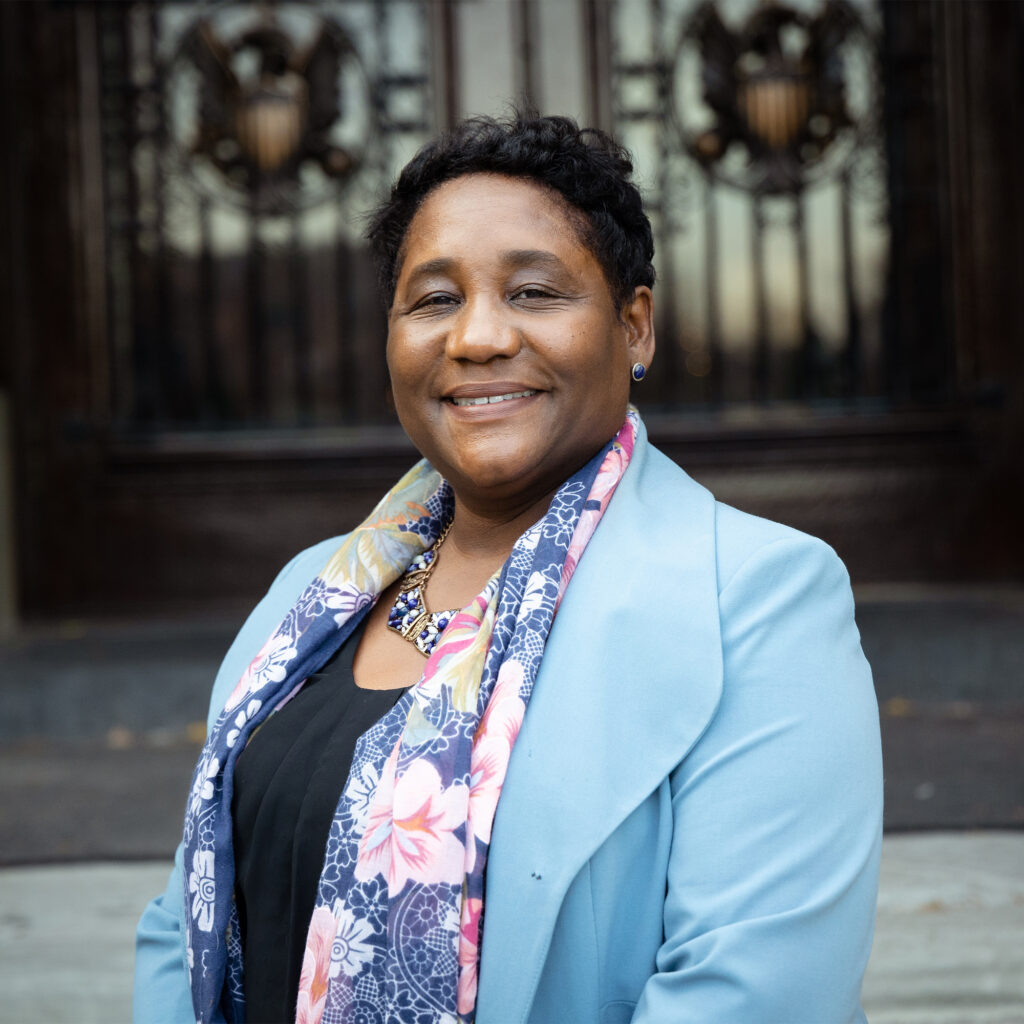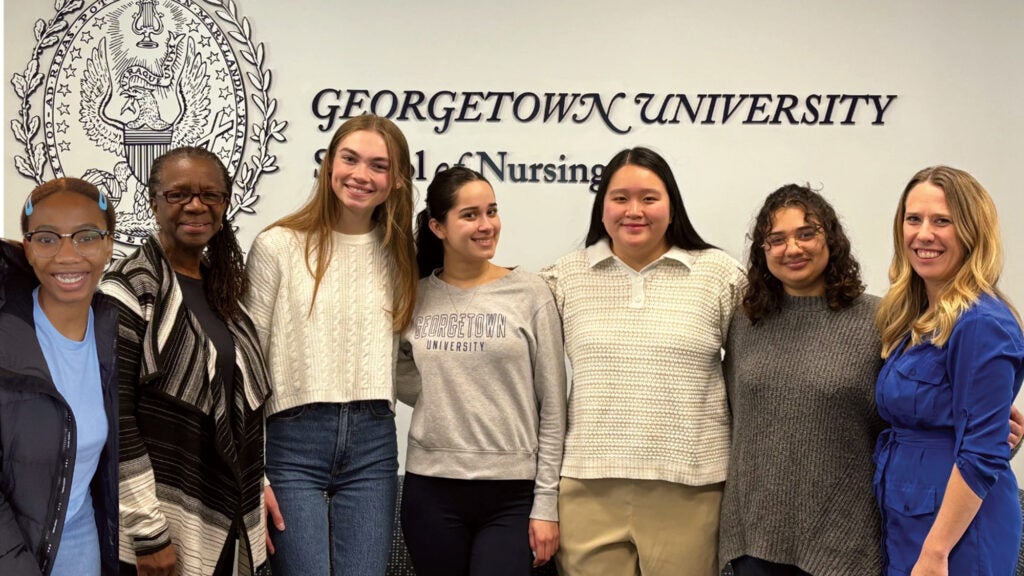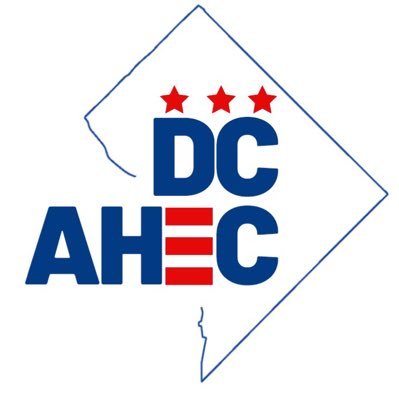Operationalizing our vision, living our Jesuit, social and racial justice values, and embracing the need to nurture the mind, body and spirit to promote maximum health and flourishing requires us to think boldly and creatively. This is what we do at Georgetown University School of Nursing.

Equity, Diversity, Inclusion, Belonging and Justice Declaration
Georgetown University School of Nursing, consistent with Georgetown’s Catholic, Jesuit identity, supports an academic environment that is equitable, diverse, inclusive and respectful. We commit to building upon and promoting this work through humility and the transparent practices, policies, resources, and values of our academic community. Within this just culture, advocacy is expected and promoted to discourage, and actively intervene when there is unacceptable behavior.
Bias, discrimination, prejudice, racism and other oppressive mechanisms threaten our collective humanity by harming the ability of individuals and communities to truly flourish. These harms may be directed at persons and/or communities, expressed overtly or implicitly, and occur at the interpersonal, institutional, and structural levels. These mechanisms are in direct conflict with our values of equity, diversity, belonging, justice and the common good.
The School of Nursing strives to promote health equity and spurns racism, faith-based persecution, discrimination against transgender and gender diverse people, sexism, heterosexism, ageism, ableism, ethnocentrism, sizeism and others. Understanding intersectionality, the connections among these identities, and power relations are paramount to advancing justice and equity.

Mission and Commitment to Anti-Racism
The Georgetown University School of Nursing is committed to advancing racial justice through awareness and action, seamlessly integrating antiracist education in our learning, clinical spaces and research, and focusing on cultural safety for learners across our programs. Universalizing and institutionalizing a racial-justice approach to health care will enhance care provided to individuals, families and communities. Our commitment to a better future requires an honest examination of the past and the present, actively leaning into discomfort to understand, learn and create change where injustice exists.
The School of Nursing developmental path towards anti-racism efforts encompasses:
- Individual work: Enhance self-learning about race, racism, antiracism and the impact of power, privilege and oppression on our learners, clients, communities and each other.
- Proximal work: Recognize and understand how racism informs how individuals interact with each other and in their local environments.
- Institutional work: Confront and dismantle institutional racism and promote racial justice in nursing programs and the Georgetown University School of Nursing.
- Structural work: Advance changing systemic policies and practices at Georgetown University that impede racial justice.
Diversity, Equity, Inclusion, Belonging, and Anti-Racism Committee
In collaboration with the Georgetown and external communities we serve, the Diversity, Equity, Inclusion, Belonging, and Anti-Racism Committee creates and maintains environments of inclusion, acceptance and equity that fosters well-being and flourishing for all.
As part of this work, the committee:
- Collects and analyzes data related to diversity in the curriculum, student admission, retention and success, culture climate within the classroom, school and clinical arenas, and hiring of staff and faculty.
- Works to promote diversity in our faculty, students and staff in order to better reflect our changing demographics and to increase the richness of our learning environments.
- Addresses support for the success of all students, including underrepresented students, across all nursing programs.
- Schedules programming and collaborates with other committees to increase literacy related to diversity, equity, inclusion, belonging and anti-racism.
- Encourages faculty and student research, scholarship and dissemination related to diversity, equity, inclusion, belonging and anti-racism as contributors to nursing science.
Committee Members: 2023-2024
Lauren Arrington (faculty)
Lisa Chaplin (faculty)
Michael Clarke (faculty)
Susan Coleman (faculty)
Megan McAuliffe (faculty)
Signey Olson (faculty)
Catherine Tierney (faculty)
Lois Wessel (faculty)
Edilma Yearwood (faculty)
Lisa Banks-Williams (adjunct faculty)
Janice Belbeck (adjunct faculty)
Emma Benson-Xu (staff)
Edith DeLeon (staff)
Lauren Hlava (staff)
Noor Bontz (G’24) (student)
Akua Yeboah (G’24) (student)
Lanika Tucker (alumna)
Nurturing Child Well Being: Educating Communities on Social Determinants of Health

The current NCWB research team (pictured from left): Christine Mauvais (N’24), Edilma Yearwood, Dylan Senescall (N’27), Diana Castro-Castro (N’25), Diana Tran (N’24), Shrishti Chhajlani (N’26), Sarah Price
Project Director: Edilma L. Yearwood, PhD, RN, FAAN
Assistant Project Director: Sarah Price, MSN, RN
Research Assistants (RAs): Christine Mauvais (N’24), Dylan Senescall (N’27), Diana Castro-Castro (N’25), Diana Tran (N’24), Shrishti Chhajlani (N’26), Margarita Sokolenko (N’23)
The Health Resources Services Administration (HRSA) awarded Georgetown University funding (2020-2025) through its Healthy Tomorrows Partnership for Children Program for the project titled “Nurturing Child Well Being: Educating Communities on Social Determinants of Health (SDOH).” This project addresses family and community dynamics along with existing social drivers that can negatively impact child and family health. The project team educates parents, health care providers and teachers to increase their literacy levels about SDOH and provides them with strategies to mitigate the negative impact of SDOH. We strive to improve overall child health outcomes and promote well-being in children residing in the District of Columbia, Northern Virginia and Maryland. Project activities aim to facilitate measurable improvements in health literacy, practice, service delivery, program development and policymaking in the region. We particularly work with under-resourced and underserved communities.
Key project activities have included:
- Presentations/conversations with immigrant or low-income families on SDOH discussing available resources within their communities
- Knowledge development
- Sharing resources with clinical teams at local community health centers, Children’s National Medical Center and teachers and teacher aides serving Head Start programs in Falls Church, Va.
- Developing robust resources that are at an appropriate literacy level, culturally aligned, accessible and practical
Georgetown University School of Nursing has spearheaded this work by using several unique approaches:
- Undergraduate nursing students have served as Research Assistants (RAs) for the project since its inception, working to develop resources including infographics and a project website and give presentations to families and community organizations, among other activities.
- Each activity, material and product has been co-designed or informed by an advisory board member or a community member/participant, who has provided feedback on any gaps or needs they perceive within the content.
- The project has cultivated existing and new partnerships to provide programmatic support, linkages to other entities, and feedback/evaluation, particularly the Project Advisory Board composed of pediatricians, a pediatric nurse practitioner, school nurse, lawyer, health service administrators and health center staff.
Area Health Education Centers Program (AHEC)
AHEC programs were developed by Congress in 1971 to recruit, train and retain health professionals committed to underserved populations. The District of Columbia AHEC, led by Georgetown University, serves with the mission of meeting health workforce needs and improving the health of the public of the District of Columbia and beyond. The AHEC program helps bring the resources of academic medicine to address local community health needs. Currently, there are approximately 56 AHEC programs with more than 235 centers in operation in almost every state and the District of Columbia.

The AHEC mission is to enhance access to quality health care, particularly primary and preventive care, by improving the supply and distribution of health care professionals via strategic partnerships with academic programs, communities and professional organizations.
The GU AHEC program is focused on:
- Providing scholarships for students committed to primary care
- Providing mentorship by practicing primary care clinicians
- Providing longitudinal community-based learning and clinical experience in underserved settings
- Providing leadership training, research, and education on health disparities and health
- Students at the School of Nursing can participate in two different AHEC programs.
AHEC Mentorship
This program links students seeking mentors with professionals in the field who can guide them through their academic endeavors to reach their career goals. View more information about the Primary Care Mentorship Program.
AHEC Scholarship
APRN students who are in a clinical rotation in a Federally Qualified Health Center or a similar community health setting (mobile van, school-based clinic, migrant heath, Indian Health Service, corrections medicine) may apply to be an AHEC scholar. Students are required to complete 40 clinical hours in this site, plus an additional 40 hours of didactic work (interprofessional education, behavioral health integration, social determinants of health, cultural competency, practice transformation, opioid use disorder, and COVID-19). Upon completion, students will receive recognition as an AHEC scholar and a stipend to help with their studies. View application information. For more information about the PCS please contact our Project Coordinator at AHECScholar@georgetown.edu or visit our website.
This project is supported by the Health Resources and Services Administration (HRSA) of the U.S. Department of Health and Human Services (HHS) as part of an award totaling $722,740 with 50% financed with non-governmental sources. The contents are those of the author(s) and do not necessarily represent the official views of, nor an endorsement, by HRSA, HHS, or the U.S. Government. Please visit HRSA.gov.
RADIANCE Grants
In 2022, Georgetown University School of Nursing faculty were awarded several $3,500 RADIANCE (Respect, Advocacy, Diversity, Inclusion, ANti-racism, Collaboration, Equity) grants from the Office of Faculty and Academic Affairs of GUMC.
RADIANCE grants aim to contribute to a culture of respect, inclusion and belonging through strategies that promote advocacy, diversity, anti-racism, collaboration and/or equity.
The necessity to provide resources to advance faculty development, curriculum and programming with respect to respect, advocacy, diversity, inclusion, anti-racism, collaboration and equity were crystallized in April 2021 during a panel discussion titled “Black Women Lead Panel: Navigating Intersections of Race & Gender in Academic Medicine.” The event was organized by Susan Cheng, senior associate dean for the Office of Diversity, Equity, Inclusion & Belonging (ODEIB) in the School of Medicine. The idea had been cultivated in collaboration with ODEIB and the GUMC Faculty Development Committee Design Team on Mentoring for Faculty Underrepresented in Medicine.
Learning, Equity, Access and Pedagogy (LEAP) Initiative
About LEAP
The Learning, Equity, Access and Pedagogy (LEAP) Initiative is intended to build and sustain inclusive learning environments for students with a focus on experiences, context, reflection, action and evaluation. LEAP embraces “development of justice-oriented mindsets,” by addressing structural and institutional practices that serve as barriers to equitable access for all to an educational institution like Georgetown University.
School of Nursing LEAP Program: Diversity and Equity Student Scholars (DESS)
Faculty have identified a need to recruit, admit and retain a more diverse student body across all School of Nursing programs. Historically, our programs have not been able to attract and retain a student body that adequately reflects the changing demographics of the patients we serve. Recently, the nursing profession has prioritized the importance of diversifying the nursing workforce to address the current nursing shortage, health inequities, and challenges associated with trust, access and the existing diverse cultural needs. The Future of Nursing document (2021) calls on the profession to “recruit and support diverse students that reflect the populations they serve.” To date, most diversity, equity, inclusion, belonging and anti-racism efforts have focused on the faculty. The LEAP focus for the School of Nursing will intentionally focus on our students. The goal is to develop the knowledge, skills and attitudes of our student scholars specific to diversity, equity, inclusion, accessibility and belonging. These scholars will serve as allies, role models and mentors among their peers and across various environments such as the classroom, clinical site and campus.
Goals
- Develop a Diversity and Equity Student Scholars (DESS) program to support nursing students (all levels, all programs).
- Engage DESS in areas of student recruitment, development of retention strategies and mentoring of underrepresented fellow students to support their belonging, engagement, and success in the nursing programs.
- Educate DESS participants in competencies related to allyship; diversity; equity; inclusion; belonging as social justice drivers; peer mentoring; communication; anti-racism; leadership skills; and transfer of these competencies to the classroom, school and patient care environments.
- Assess effectiveness of an 18-month Diversity and Equity Student Scholars Program.
DEIB Speakers Series
The Georgetown University School of Nursing hosts a monthly development series focused on issues related to diversity, equity, inclusion, belonging and anti-racism.
Resources for Our Community
Anti-Racism & Racial Justice at Georgetown University Medical Center
Racial Justice Committee for Change
Resources to Support Our Community in Diversity at Georgetown University
Contact Us
Please contact us for additional information about the initiatives and activities presented on this page, as well as suggestions for additional resources to include.
